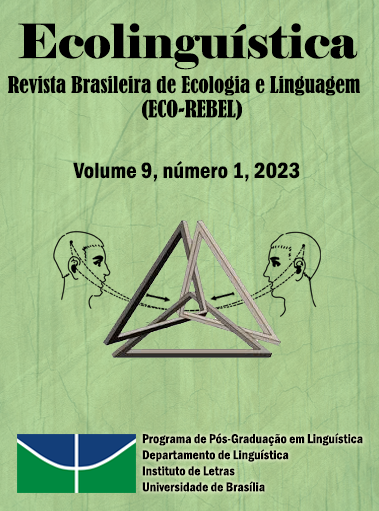Preservice teachers' ecological literacy dispositions: ideology and praxis
Abstract
As preocupações ecológicas no século 21 aumentaram à medida que obtemos mais informações sobre a situação atual do mundo graças ao desenvolvimento tecnológico. Ficou evidente que existe uma relação direta entre as ações humanas e a deterioração da natureza. A alfabetização ecológica pode ser uma resposta a esses problemas porque as pessoas ecologicamente alfabetizadas tendem a moldar suas vidas para viver em paz com a natureza. Professores de línguas podem integrar questões ecológicas em sua prática, pois qualquer tópico sobre questões mundiais pode ser um material para o ensino de línguas. No entanto, os professores de línguas devem ter as habilidades de alfabetização ecológica para incorporar os problemas ecológicos em sua prática e aumentar a conscientização do público. Este estudo teve como objetivo explorar o conhecimento ecológico, comportamento e atitudes de professores de inglês em formação em uma universidade pública na Turquia. Um questionário coletou os dados de 50 alunos da primeira série e 40 da terceira série do ensino de língua inglesa. A análise foi realizada através do SPSS 25.0. Os resultados mostraram que os professores em formação geralmente tinham atitudes e comportamentos positivos. Seus níveis de conscientização sobre resíduos, reciclagem e meio ambiente sustentável foram altos. As respostas dos alunos sobre meio ambiente sustentável indicaram que eles foram informados sobre como um meio ambiente sustentável poderia ser alcançado.
Downloads
Downloads
Published
How to Cite
Issue
Section
License

This work is licensed under a Creative Commons Attribution-NonCommercial-NoDerivatives 4.0 International License.
Authors who publish in this journal agree to the following terms:
Authors retain copyright and grant the journal the right of first publication. The work is simultaneously licensed under the Creative Commons Attribution License allowing the sharing of the work with acknowledgment of the authorship of the work and initial publication in this journal.
Authors are authorized to enter into additional contracts separately for non-exclusive distribution of the version of the work published in this journal (e.g., publishing in institutional repositories or as book chapters), with acknowledgment of authorship and initial publication in this journal.
Authors are allowed and encouraged to post and distribute their work online (e.g., in institutional repositories or on their personal page) at any point before or during the editorial process, as this can bring about productive revisions as well as increase impact.
Citation of published works (See The Effect of Free Access).



3.png)



